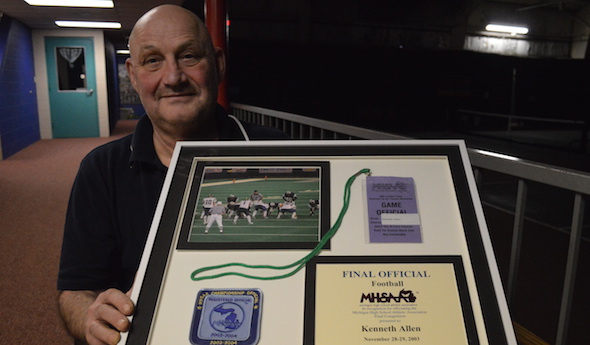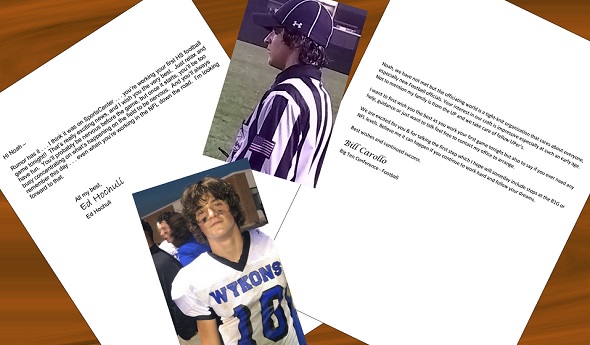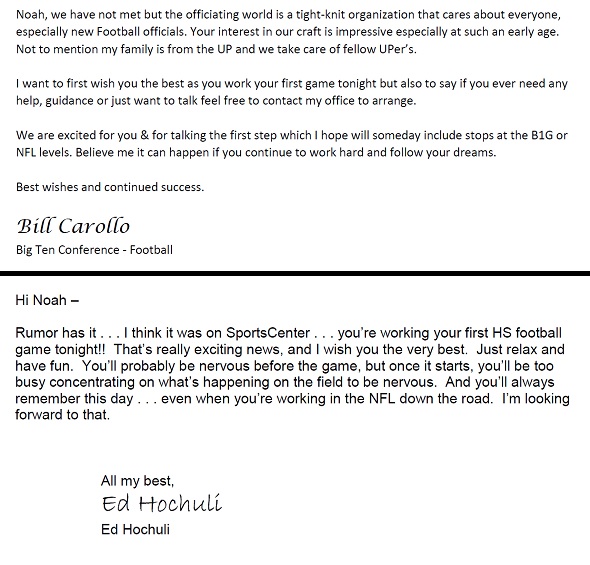
Umpire's Heart Healed, Back in the Game
April 4, 2017
By Mike Spencer
Special for Second Half
Ken Allen can’t wait to say the words “Play Ball!’ today.
Weather permitting, the Traverse City softball umpire is expected to be behind the plate at Kingsley this afternoon after missing all of the spring season last year due to a heart double by-pass surgery.
“I’m sure It’s going to be exciting,” said Allen, a 32-year MHSAA umpire, basketball and football referee. “Especially after taking a year off from softball.
“But once the game gets started and you make that first call, it’s going to be right back to the old business.”
Allen, who has hardly missed a game since Dick Simon recruited him to officiate in 1985, was glad he went to his primary care physician after he noticed he was slowing down at the end of the 2015-16 boys and girls basketball season.
Allen’s doctor did an EKG and referred him to a heart surgeon, where he underwent a cardiac catheterization. Before the visit with the heart specialist was over, Allen was wheeled up to the second floor for heart surgery.
“It changed things, but I keep telling everybody that the man above gave me a second chance and I’m going to take full advantage of it,” said Allen, who was told he’d need at least three months to recuperate. “It was hard to be idle.”
“Ken is an ‘old school’ die hard,” said Barb Beckett, a charter member of the Northern Sports Officials Association, former officiating partner and assignor. “He is an assignor’s dream because he will go anywhere, work any level, and anytime.
“It was tough on him missing the last part of the basketball season and entire softball season. He makes a difference every time he steps on the court or the field."
Allen, who has officiated two MHSAA Finals in softball and another in football, never thought about retiring after his double by-pass on March 3, 2016.
“I never had a thought about quitting, and I don’t have a plan to retire,” Allen said. “I’m going to go as long as I can.
 “When I can’t give the kids a full 100 percent, it’ll be time to get out.”
“When I can’t give the kids a full 100 percent, it’ll be time to get out.”
Allen had a clean bill of health to officiate football last fall, but he missed two weeks of the season after having his gall bladder removed. He then went on to work the entire boys and girls basketball season, which ended last month.
“Ken has always been a very hard-working official, and it’s no surprise to anyone that he has worked so hard to get back on the field and court,” said MHSAA assistant director Mark Uyl, the association’s coordinator of officiating. “Ken always had a true passion for officiating, and this passion has helped him recover and has been a source of motivation to get healthy and rehab so he can return to the competitive arena.”
Uyl said life-threatening illnesses and injuries often send veteran officials into early retirement.
“For many other officials, what Ken endured would have meant retirement or the end of their career, certainly in a sport like basketball,” Uyl said. “It shows how important working with the kids and schools is to Ken that he’s persevered so hard to get back.”
Allen also officiated baseball until the day he lost a coin flip and had to leave his softball game because no one showed up at the baseball field. His softball partner Tom Post tooted his horn departing after two quick softball games and Allen was still in the bottom half of his opener.
Although Allen has officiated two MHSAA softball championship games, football is his No. 1 sport. He worked a 2003 MHSAA Final as the umpire.
“When I first started out, I was on the chains,” said Allen, who played freshman football at Clio High and ran track and cross country. “Then I decided that I wanted to get in the middle where the action is. I really love it.”
Allen’s taken a few knocks in the middle of the football field, even suffered a couple of concussions. But until the heart double by-pass, he was always able to get back up on his feet without hardly missing a down.
“Ken is a great official because he’s got such good people skills,” Uyl said. “The officiating business is a ‘people business’ first and foremost, and this is why this has been such a great fit for Ken for the past 30-plus years. The MHSAA and all member schools are thrilled to have Ken back!”
Author Mike Spencer is a MHSAA registered official in boys and girls basketball and soccer. He spent more than three decades as a newspaperman before becoming a marketing communications specialist two years ago.
PHOTOS: (Top) Ken Allen, a 32-year veteran official from Traverse City, shows off his most memorable moment in high school officiating with photos and items he received after doing a 2003 MHSAA Finals assignment. (Middle) Allen kneels behind the plate; today he’ll return to action for the first time after heart surgery.

The Official View: Just the Beginning
By
Brent Rice
MHSAA Assistant Director
September 24, 2018
By Brent Rice
MHSAA Assistant Director
This week’s “Official” View features a Legacy official who received a couple of very cool letters of encouragement from some very important people in recognition of his first MHSAA football contest.
Noah Lewis, out of Iron River, plays wingback and cornerback for West Iron County. This past Thursday night he served as a head linesman for a subvarsity game with close monitoring from his dad from the sidelines and the rest of the crew.
However, letters from NFL veterans Ed Hochuli and Bill Carollo also provided him some unexpected sage advice. Hochuli told Noah to “Just relax and have fun,” while Carollo offered to be there for Lewis for guidance or to provide a listening ear.
It’s Official!
Report Writing 101: Officials should be submitting incident reports whenever documenting ejections, unusual situations, or sportsmanship praises or concerns. While we certainly don’t need reports that would challenge Dickens in the writing department (we do get some of these), we do need enough detail that a clear picture is painted of the event for those administrators and directors in the Association office who are not present for the actual incident.
The who, what, where, when, and why of writing all apply. We need to know who is involved (name and number), what occurred leading up to the incident, when it occurred during the contest and why the official took the action he or she did.
Language counts … while we appreciate your discreetness when foul language occurs, please write what was said and done in detail – this includes writing out profanities in the report rather than “#^$*@^~!” or “bleeping.”
As Joe Friday would say, “Just the facts.” We don’t need any fluff or opinion. This means you don’t need to say that the play was close, that you got it right, the day was “blustery” or that “the coach was clearly out of control.” Tell us just the things we need to know to create the setting and what was said and done that led to your action.
Finally, you must complete the report within 48 hours of the end of the contest. Sooner would be better. There is nothing worse than trying to speak to a coach or administrator about an incident when we don’t even have the side of the official(s) yet.
P.S. Run your report through spell and grammar check before submitting if you have the opportunity.
Rule of the Week
CROSS COUNTRY One of the visiting coaches approaches the referee and points out to her where logs have been placed across the course to make it more challenging. This coach objects to these artificial barriers.
Ruling: These artificial barriers on the course must be removed so the course is clear of these obstructions.
It’s Your Call
FOOTBALL This week we look at the enforcement of the blindside block foul in football. It’s 3rd-and-21 on Team A’s 26-yard line. The slot receiver, #8 for white, clearly commits a blindside block in violation of the rules. With forceful contact, he blocks an opponent who does not see the blocker approaching.
One of the keys to look for in this play on the field is offensive players returning back towards the line of scrimmage. The question this week is: What is the down and distance if Team B (a) accepts (b) declines the penalty?
Last Week’s IYC Ruling: The swimmer did not make a legal turn since he took additional strokes after turning toward the breast. While swimmers may turn and independently kick or glide after their head passes the backstroke flags, they may not take any additional arm pulls other than in the actual turning action (8-2-f-1).
The Official View
Here's a closer look at those notes received by Noah Lewis, the aspiring Legacy Program official from Iron River:


